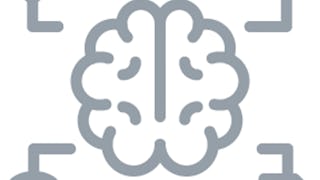- Browse
- Artificial Intelligence
Results for "artificial intelligence"
 Status: NewNewStatus: Free TrialFree Trial
Status: NewNewStatus: Free TrialFree TrialSkills you'll gain: Legal Technology, Legal Strategy, Legal Risk, Responsible AI, Data Ethics, Legal Research, Compliance Management, Document Management, Regulation and Legal Compliance, Generative AI, Litigation Support, Client Services, Mediation, Anthropic Claude, AI Security, Case Law, AI Enablement, Law, Regulation, and Compliance, Artificial Intelligence, Risk Management
4.3·Rating, 4.3 out of 5 stars58 reviewsBeginner · Specialization · 3 - 6 Months
 Status: Free TrialFree TrialL
Status: Free TrialFree TrialLL&T EduTech
Skills you'll gain: Machine Learning Algorithms, Internet Of Things, Artificial Intelligence, Unsupervised Learning, Python Programming, Embedded Software, Computer Vision, Peripheral Devices, Integrated Development Environments, Deep Learning, Applied Machine Learning, Image Analysis, Machine Learning, Embedded Systems, Civil Engineering, Computer Programming Tools, Wireless Networks, Automation, Digital Transformation, Real Time Data
4.6·Rating, 4.6 out of 5 stars312 reviewsIntermediate · Specialization · 3 - 6 Months
 Status: NewNewStatus: Free TrialFree Trial
Status: NewNewStatus: Free TrialFree TrialSkills you'll gain: Income Statement, General Ledger, General Accounting, Financial Reporting, Ledgers (Accounting), QuickBooks (Accounting Software), Financial Statements, Excel Formulas, Balance Sheet, Financial Accounting, Accounting Records, Accounting, Spreadsheet Software, Microsoft Excel
Beginner · Course · 1 - 4 Weeks
 Status: Free TrialFree Trial
Status: Free TrialFree TrialSkills you'll gain: Feature Engineering, Model Evaluation, Applied Machine Learning, Advanced Analytics, Analytics, Statistical Machine Learning, Machine Learning, Scikit Learn (Machine Learning Library), Unsupervised Learning, Machine Learning Algorithms, Workflow Management, Data Ethics, Supervised Learning, Data Preprocessing, Random Forest Algorithm, Decision Tree Learning, Verification And Validation, Python Programming, Classification Algorithms, Performance Tuning
4.8·Rating, 4.8 out of 5 stars593 reviewsAdvanced · Course · 1 - 3 Months
 Status: Free TrialFree TrialU
Status: Free TrialFree TrialUUniversity at Buffalo
Skills you'll gain: Digital Transformation, Manufacturing Processes, Manufacturing Operations, Automation Engineering, Industrial Engineering, Business Transformation, Production Process, Digital Design, Supply Chain Management, Data-Driven Decision-Making, Market Dynamics, Workforce Development, Cybersecurity
4.7·Rating, 4.7 out of 5 stars3.6K reviewsBeginner · Course · 1 - 4 Weeks
 Status: NewNewStatus: PreviewPreviewC
Status: NewNewStatus: PreviewPreviewCCoursera
Skills you'll gain: LangGraph, AI Orchestration, LangChain, LLM Application, Agentic Workflows, Generative AI Agents, MLOps (Machine Learning Operations), Context Management, Distributed Computing, Software Design Patterns
Intermediate · Course · 1 - 4 Weeks
 Status: NewNewStatus: PreviewPreviewS
Status: NewNewStatus: PreviewPreviewSSimplilearn
Skills you'll gain: Email Marketing, Marketing Analytics, Campaign Management, Marketing Automation, Web Analytics, Web Content, Account Management, Dashboard, Customer Data Management, Automation, Content Management, Configuration Management
Beginner · Course · 1 - 4 Weeks
 Status: NewNewStatus: PreviewPreviewB
Status: NewNewStatus: PreviewPreviewBBoard Infinity
Skills you'll gain: Google Analytics, Marketing Analytics, Web Analytics, Marketing Effectiveness, Campaign Management, Digital Marketing, Target Audience, Customer Insights, Analytics, Performance Analysis, A/B Testing, Dashboard, Performance Metric, Content Strategy
Beginner · Course · 1 - 4 Weeks
 Status: NewNewStatus: Free TrialFree Trial
Status: NewNewStatus: Free TrialFree TrialSkills you'll gain: Microsoft Excel, Excel Formulas, Pivot Tables And Charts, Spreadsheet Software, Data Analysis Expressions (DAX), Financial Forecasting, Financial Modeling, Financial Analysis, Business Analysis, Data-Driven Decision-Making, Data Manipulation
Beginner · Course · 1 - 4 Weeks
 Status: Free TrialFree Trial
Status: Free TrialFree TrialSkills you'll gain: Dashboard, Data Storytelling, Tableau Software, Peer Review, Data Visualization Software, Presentations, Data Visualization, Interactive Data Visualization, Data Cleansing, Business Intelligence, Real Time Data, Data Manipulation, Transact-SQL, Data Quality, Data Transformation, Data Preprocessing, Data Validation, Data Sharing, Data Integration, Data Analysis
4.7·Rating, 4.7 out of 5 stars74 reviewsAdvanced · Specialization · 3 - 6 Months
 Status: NewNewStatus: Free TrialFree TrialC
Status: NewNewStatus: Free TrialFree TrialCCoursera
Skills you'll gain: Procurement, Strategic Sourcing, Bidding, Proposal Development, Standard Operating Procedure, Business Writing, Decision Making, Data Compilation
Beginner · Course · 1 - 4 Weeks
 Status: NewNew
Status: NewNewSkills you'll gain: MITRE ATT&CK Framework, Cyber Threat Hunting, Incident Response, Cyber Threat Intelligence, Digital Forensics, Threat Detection, Endpoint Detection and Response, Computer Security Incident Management, Microsoft Windows, Exploitation techniques, Threat Management, Endpoint Security, Cyber Security Strategy, Event Monitoring, Cyber Attacks, Cybersecurity, Cyber Security Policies, Network Security, Cyber Risk, Information Technology
Beginner · Course · 3 - 6 Months
Searches related to artificial intelligence
In summary, here are 10 of our most popular artificial intelligence courses
- AI in Law: Research, Risk, and Legal Drafting: Coursera
- Intelligent Digital Factories: L&T EduTech
- Financial Statements: Compile & Classify Accounts: Coursera
- The Nuts and Bolts of Machine Learning: Google
- Digital Manufacturing & Design: University at Buffalo
- LangGraph Framework: Coursera
- Mailchimp Basics Training for Beginners: Simplilearn
- Google Analytics: Quick Wins and Hacks for Marketers: Board Infinity
- Master Advanced Excel Functions to Analyze & Automate Data: EDUCBA
- Tableau Data Analyst Certification Preparation: SkillUp










